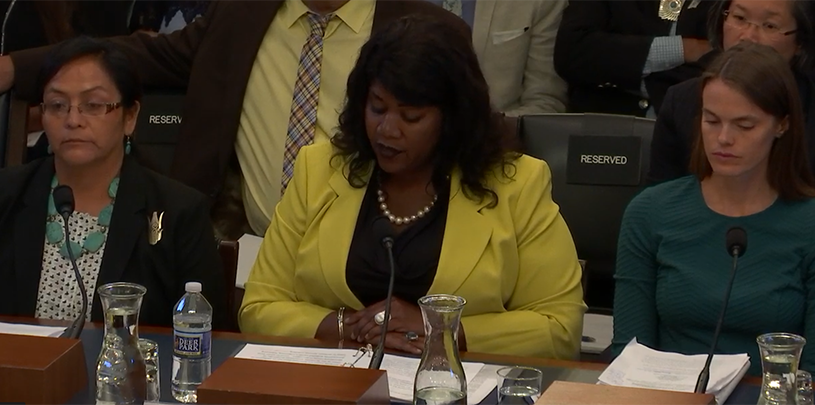
 by Roger Clark, Grand Canyon Director
by Roger Clark, Grand Canyon Director
A bill that would permanently stop uranium mining around the Grand Canyon is making progress in Congress, while the mining industry’s bid to end a temporary ban is still pending.
Last week, a House Natural Resources subcommittee heard strong public support for the Grand Canyon Centennial Protection Act, which would protect more than a million acres of public land surrounding Grand Canyon National Park from new uranium mining.
“Grand Canyon National Park is the lifeblood of our community and economy and protecting it now and for future generations is of paramount interest,” Mayor Coral Evans told members of the House subcommittee. The mayor of Flagstaff, Arizona also submitted her city’s resolution in support of the bill.
The numbers reinforce the point. A recent economic report shows that 6.4 million visitors spent almost $950 million in local gateway regions while visiting Grand Canyon National Park. That spending supported over 12,500 jobs, with a cumulative economic benefit of $1.2 billion. Uranium mining, on the other hand, supports few and temporary jobs.
“Permanently contaminating the Grand Canyon threatens the loss of billions of dollars to the backbone of our regional economy,” Grand Canyon Trust Energy Director Amber Reimondo testified.
To the Havasupai people living at the bottom of the Grand Canyon who rely on its life-giving waters, the threat is even greater.
“Uranium mining has already poisoned and will continue to poison the Grand Canyon,” said Havasupai Tribal Council member Carletta Tilousi. “It will poison the groundwater and aquifers…the land, the plants, the animals, the people that live there, and the visitors."
When Rep. Raúl Grijalva, D-Ariz., introduced the bill on the south rim of the Grand Canyon days before the park's centennial anniversary this February, he said, "Protecting the canyon is just, it's overdue and it's life-affirming...The public wants us to do it, the economies of the region need it and the Grand Canyon's future depends on it."
We couldn't agree more.
The Natural Resources Committee is expected to vote on the Grand Canyon Centennial Protection Act (H.R. 1373) later this month. With more than 100 congressional members co-sponsoring the bill, it stands a good chance of being passed by the House later this year.
However, Arizona’s senators have yet to endorse or introduce the Grand Canyon Centennial Protection Act, despite a statewide study showing the majority of Republicans, Independents, and Democrats support the current 20-year ban (issued in 2012) on new uranium mining on public lands surrounding the park. The poll found that nearly three-quarters of Arizona voters view outdoor recreation and tourism as more important to the state’s economic future than mining.
Earlier this year, the Senate voted 92 to 8 to protect Yellowstone National Park from mining on adjacent public lands. Noting that the Grand Canyon deserves the same protection, former Sen. Mark Udall and Cindy McCain, widow of Sen. John McCain, said:
It's time for the new Congress to reach across the aisle and carry on our long bipartisan tradition of stewardship for this crown jewel of our national park system.
Meanwhile, the temporary ban on uranium claims around the Grand Canyon is threatened by a new report published by the U.S. Department of Commerce calling for a thorough review of all mining bans in response to an industry-supported push to increase mineral production on America’s public lands.
This new report, combined with the industry’s pending petition to require quotas on the use of domestically mined uranium for U.S. nuclear power production, continue to put the Grand Canyon’s future at risk.
The Grand Canyon Centennial Protection Act would end that risk.
Local governments, sporting groups, more than 200 businesses, and the majority of Arizona voters oppose uranium mining around the Grand Canyon. An ever-growing consensus supports this common-sense solution. As Tilousi concluded: "Many voices, together, will stop uranium mining in this region.”
The Colorado River below Glen Canyon Dam is heating up. Find out why.
Read MoreGroundwater pumping at a uranium mine near the Grand Canyon will affect the canyon's springs, scientists says.
Read MoreArizona Governor Katie Hobbs is the latest elected official to call for an environmental review of Pinyon Plain uranium mine.
Read More